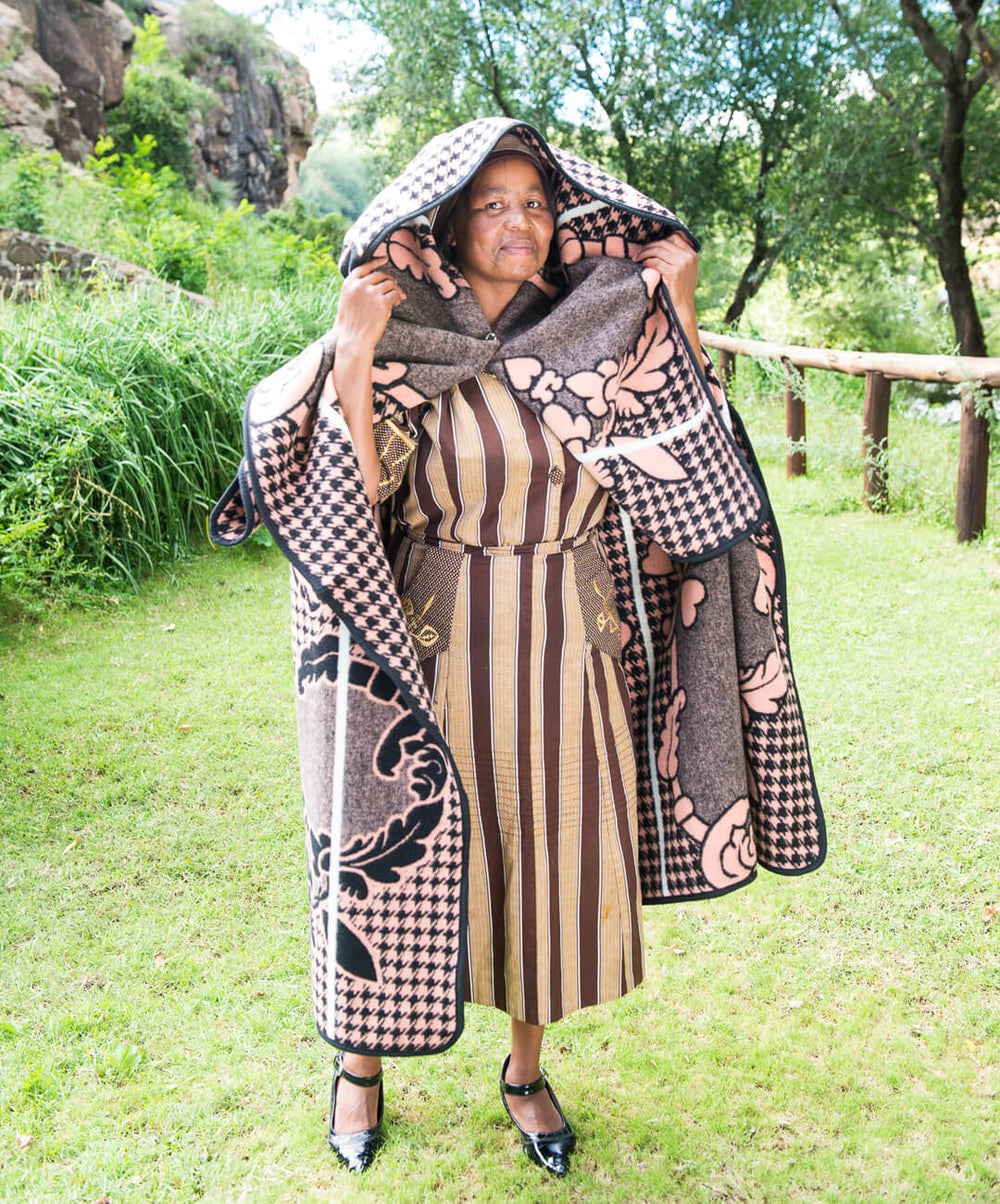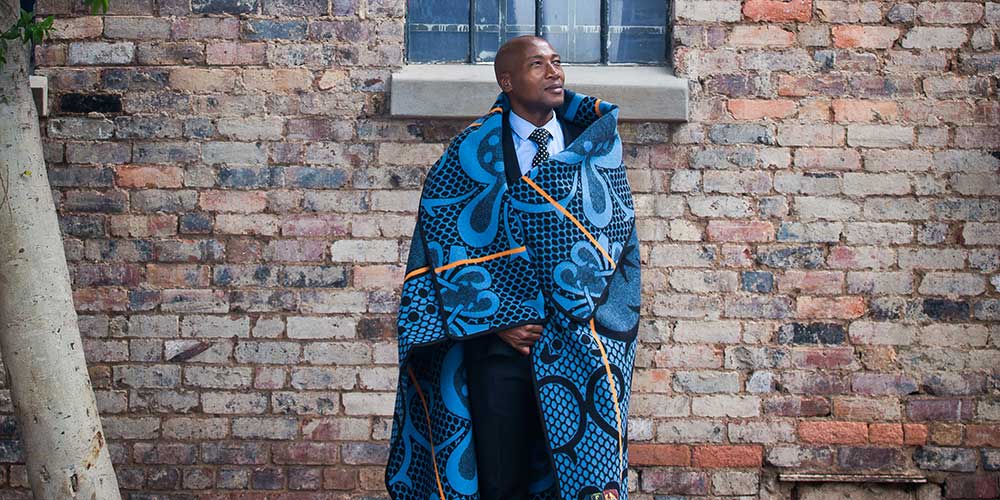Your Cart is Empty
FREE u.s shipping over $250
FREE u.s shipping over $250
shop
Lesotho and The Basotho Blanket Connection
9 min read

What's in this article
Lesotho "The mountain Kingdom
Lesotho, officially the Kingdom of Lesotho
A relatively small, landlocked mountainous country located entirely within the borders of South Africa. Lesotho has a population of around 2 million people and is just over 11583 square miles. The entire country lies above 3,281 ft which leads to its moniker as the Mountain kingdom. The capital, Maseru is located directly on the Lesotho-South Africa border. Interestingly Lesotho is by far the biggest one of only three other countries in the world that are surrounded by the territory of another country. The Vatican and San Marino being the other two. It is also the only territory located outside of Italy and unlike the Vatican and San Marino is not a microstate.

Lesotho's population consists almost entirely of the Basotho, a Bantu-speaking people. Approximately 99 percent of the people in Lesotho identify as Basotho. Sesotho is The primary language spoken regularly by the Basotho and it is also the first official language and is used government and most official institutions.
The Basotho Blanket Traditional History
According to UNESCO, they estimate, 85% of women and 68% of men over the age of 15 are literate making Lesotho one of the highest rates of literacy in Africa. However, even with this relatively high rate of literacy, many Lesotho people battle to get access to the basic needs of healthcare, travel, and educational resources

The Basotho Blanket in Basotho culture
Traditional attire revolves around the Basotho blanket, a thick covering made primarily of wool and a grass-made hat called a"Mokorotlo" a conical style hat with a unique shape and design on the top. It looks like the Qiloane mountain in a pinnacle shape The blankets are ubiquitous throughout the country during all seasons and worn differently by men and women.
The Basotho Blanket Origins
According to transcripts, the Basotho Blanket was originally gifted to King Moshoeshoe I
Who ruled Lesotho from 1822–1870 by a British man known only as "Mr. Howell" in the mid to late 19th century, these blankets quickly gained enormous popularity in the Lesotho region and were used by herdsmen and royalty alike
Basotho blankets have very specific uses for different occasions from formal to everyday wear. The way that Basotho men wear these traditional blankets is based on the traditional Kaross, a traditional animal (primarily sheep) skin cloak although their transformation to "factory-woven textile" is attributed to King Moshoeshoe I.
The animal skin Karosses were becoming increasingly difficult to source and there was frequently insufficient quantity to supply the Basotho nation. By around 1872 a large majority of the traditional Kaross were replaced by poor quality cotton made blankets. In 1876 the Then king secured the production

The Basotho Blanket securing the heritage
The King secured the production of "special blankets" in 1876
After meeting with Scottish textile manufacturer Donald Fraser. These new blankets were not only sturdier but they could also be fashioned in a way that more resembled the Kaross and they therefore quickly replaced the poor quality imported cloth that the people of Lesotho were previously wearing.
The Basotho Blanket in popular Culture
Louis Vuitton's designs for the 2017 menswear collection featured designs from Basotho Blankets which caused controversy in South Africa with accusations of cultural appropriation.[1]
In the 2018 films Black Panther and in Avengers: Infinity Wars, W'Kabi and his tribesmen appear in many scenes wearing the Basotho blanket. Given that the actors in the film were not from Continental Africa, several continental African groups viewed the appropriation of these cultural symbols as inappropriate for use by diasporic Africans. The movie however brought the blankets to international attention and an increase in sales.
The Basotho Blanket Today
The traditional Basotho blanket still plays a very important role in the daily life of the Basotho people and despite urbanization
The Basotho remain loyal to their traditions and treasure it.
The wearing of blankets by the Basotho as part of daily life intrigues visitors to Lesotho and the surrounding Eastern Free State. It seems to be a form of westernization however, with a closer look, the wearing of Basotho blanket reveals a sociocultural phenomenon with a unique history. To the Basothos, besides the practical value of the blankets, there are social and symbolic values inherent in the blanket, national identification has become one of the most important, announcing: "I am a Basotho".

Refernces
[1]
"Fab or cultural faux pas? Louis Vuitton's Basotho blanket-inspired collection". Retrieved 2017-09-23.
Other Basotho Blanket related blogs to enjoy
FAQ - The Questions You Want Answered
Why is Lesotho famous?
- Its unique geography: Lesotho is the only country in the world that lies above 1,000 meters in elevation. It is also home to the highest peak in southern Africa, Thabana Ntlenyana, which stands at 3,482 meters.
- Its culture: Lesotho has a rich and unique cultural heritage, with traditional music, dance, and dress still practiced today. The Basotho people, the country's largest ethnic group, have a strong sense of community and identity.
- Its wildlife: Lesotho is home to various wildlife, including the rare and endangered Maloti minnow found only in the rivers of Lesotho's Maloti Mountains.
- Its tourism: Despite being one of the smallest countries in Africa, Lesotho has a lot to offer visitors. The country's stunning mountain scenery, cultural festivals, and adventure activities like hiking, horseback riding, and skiing attract many tourists yearly.
- Its political history: Lesotho has a tumultuous political history, with coups and political crises. Despite these challenges, the country has managed to maintain its independence and sovereignty and has made significant strides in improving its democracy and human rights record in recent years.
Is Lesotho richer than South Africa?
No, Lesotho is not more prosperous than South Africa. South Africa is one of the most developed and industrialized countries on the African continent, with a much larger economy and higher per capita income than Lesotho.
According to the World Bank, South Africa had a Gross Domestic Product (GDP) of USD 354.1 billion in 2020, while Lesotho's GDP was only USD 2.5 billion. South Africa's per capita income was also much higher than Lesotho's in 2020, with an estimated USD 5,797 per person compared to Lesotho's USD 1,129 per person.
However, it is worth noting that Lesotho is a small, mountainous country with a population of around 2 million. South Africa has a much larger population of around 60 million people. Additionally, Lesotho faces significant challenges related to poverty, unemployment, and HIV/AIDS and has a much lower Human Development Index (HDI) ranking than South Africa.
How rich is Lesotho?
Lesotho is classified as a lower-middle-income country by the World Bank, with a Gross Domestic Product (GDP) of around USD 2.5 billion in 2020. The country's economy is largely based on agriculture, manufacturing, and mining, focusing on diamonds, water, and textiles.
Despite being a lower-middle-income country, Lesotho still faces significant challenges related to poverty, inequality, and unemployment. According to the World Bank, around 57% of the country's population lives below the poverty line, and youth unemployment is particularly high. Lesotho also has one of the highest HIV/AIDS prevalence rates in the world, which has significantly impacted the country's economy and social development.
In recent years, the government of Lesotho has implemented several economic reforms and development initiatives to promote sustainable growth, reduce poverty, and create jobs. These efforts include investments in infrastructure, education, and healthcare, as well as support for small businesses and entrepreneurship. While progress has been made, there is still a long way to go to address the country's economic and social challenges.
Is Lesotho a first world country?
No, Lesotho is not considered a first-world country. The terms "first world," "second world," and "third world" were originally used during the Cold War to describe political and economic alliances. These terms are no longer widely used today, as they are seen as outdated and oversimplified.
Instead, countries are typically classified based on their economic development and income level. Lesotho is classified as a lower-middle-income country by the World Bank, meaning it has a relatively low Gross Domestic Product (GDP) per capita and faces significant economic and social challenges. The country has made progress in improving its human development indicators in recent years. However, it still ranks relatively low on income, education, and health measures compared to many other countries.
It's also worth noting that the terms "first world," "second world," and "third world" are often associated with outdated and inaccurate stereotypes about different regions and countries and are generally not used in contemporary discourse about global development and economics.
Is it safe to live in Lesotho?
Lesotho is generally a safe country to live in, although there are some safety concerns that residents and visitors should be aware of.
Crime is a concern in Lesotho, particularly in urban areas like the capital city, Maseru. Common types of crime include theft, burglary, and robbery, and there have also been reports of carjacking and muggings. It is essential to avoid walking alone at night and keep valuables out of sight.
Lesotho also faces some security challenges related to political instability and border disputes with South Africa. While these issues are generally not directly threatening residents, they can create tensions and occasional disruptions.
In addition, Lesotho has a high prevalence of HIV/AIDS, and healthcare facilities in the country can be limited and sometimes of poor quality. This can make it difficult to access appropriate medical care, particularly for people with HIV/AIDS.
Despite these challenges, many people live and work in Lesotho safely and happily. The country has a strong sense of community and culture, and the natural beauty of its mountains and other landscapes is a major attraction for residents and visitors alike.
Why is Lesotho so cold?
It is high altitude and location influence Lesotho's climate in the Southern Hemisphere. The country's elevation ranges from around 1,400 meters (4,600 feet) to over 3,400 meters (11,000 feet), significantly impacting its temperatures.
At higher elevations, the air is thinner, and temperatures are generally more relaxed. Lesotho's mountains also receive more precipitation than lower-lying areas, which can also contribute to lower temperatures.
Additionally, Lesotho is located in the Southern Hemisphere, meaning its seasons are opposite to those in the Northern Hemisphere. This means the country's winter months (June to August) are generally more relaxed than its summer months (December to February).
Lesotho has a highland climate, with cold winters and mild summers. Average temperatures in the winter can range from below-freezing to around 10 degrees Celsius (50 degrees Fahrenheit), while summer temperatures typically range from around 15 to 25 degrees Celsius (59 to 77 degrees Fahrenheit).
What is the most developed country in Africa?
When measuring development, many different factors exist, such as economic growth, infrastructure, education, healthcare, and political stability. Therefore, there are many answers to the question of which is the most developed country in Africa.
Some African countries are generally considered more developed than others based on various metrics. For example, according to the Human Development Index (HDI) developed by the United Nations Development Programme (UNDP), Seychelles is the most developed country in Africa, with a score of 0.801, placing it in the category of countries with "very high human development." Mauritius and Algeria are also among the African countries with high HDI scores, at 0.796 and 0.754, respectively.
Other factors that could be used to measure development, such as economic growth or infrastructure, could result in different countries being considered more developed. For example, countries like South Africa and Nigeria have relatively large economies and developed infrastructure, but their HDI scores are lower than countries like Seychelles and Mauritius. Ultimately, the answer to this question depends on how development is measured and which metrics are used.
What are the living conditions in Lesotho?
Living conditions in Lesotho can vary depending on location, income, and access to services. Overall, Lesotho is a developing country, and many residents face poverty, healthcare, and education challenges.
Poverty is a significant issue in Lesotho, particularly in rural areas where agriculture is the primary source of income. Many families struggle to make ends meet, and access to necessities like food, clean water, and healthcare can be limited.
Access to healthcare can also be a challenge in Lesotho, particularly for people living in rural areas. The country has a high prevalence of HIV/AIDS, and while antiretroviral treatment is available, access to care can be limited. Other health issues in Lesotho include malaria, tuberculosis, and malnutrition.
Education is another area where Lesotho faces challenges. While primary education is free and compulsory, access to secondary and tertiary education can be limited, particularly for girls and women. Literacy rates in Lesotho are relatively low compared to other countries in the region.
Despite these challenges, many in Lesotho can maintain a high quality of life. The country has a strong sense of community, and cultural traditions are essential to daily life. Many people in Lesotho also have access to modern amenities like electricity, running water, and internet connectivity, particularly in urban areas.












